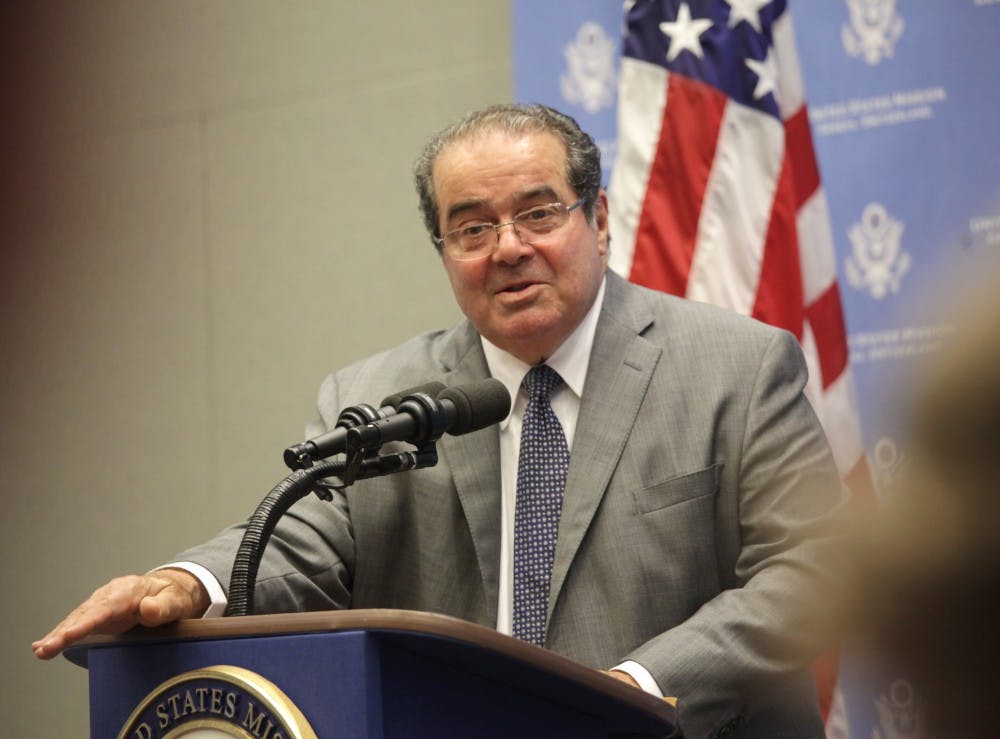
Supreme Court Justice Antonin Scalia was the intellectual anchor of the court's conservative wing | Photo by Eric Bridiers/United States Mission Geneva
Justice Antonin Scalia’s death on Saturday left the Supreme Court’s ideological composition in flux, sent Congress into a typical partisan turmoil and sparked a flood of political punditry. At Penn, the justice’s death invoked predictions by law professors and scholars on the future of the Court and constitutional interpretation in general.
Scalia was appointed by President Ronald Reagan in 1986 and served for nearly 30 years on the bench until his death, the longest serving judge out of the current justices. According to scholars, Scalia won’t just be remembered for his fiery dissents and consistent conservative voting record, but for his intellectual contributions to the originalist and textualist approaches to interpreting the Constitution.
“Scalia is the leading exponent of what has become the most common version of what used to be original intent of the Constitution,” said Rogers Smith, a political science professor and associate dean for social sciences at Penn. “In regards to interpreting statutes, [Scalia] wouldn’t look at legislative intent. He would only look at the text that [legislators] enacted, because only the text that [legislators] enacted was authoritative.”
It didn’t take long for the justice’s death to ignite a political controversy between Republicans and Democrats. While President Barack Obama has publicly expressed his intentions to nominate a new judge soon, Senate Republicans argue that a new judge should not be nominated until after the November presidential elections.
At the core of both parties’ intentions lies the desire to replace Scalia’s seat with a judge with their party’s respective political ideology.
“If you get a liberal replacement for Justice Scalia, that would be enormously important,” Kermit Roosevelt, a constitutional law professor, said. “It would change the balance of the court.”
He added, “Right now, there are a lot of constitutional areas where the Supreme Court is very narrowly split: congressional power, campaign finance reform, abortion. In all of those areas, it would depend in part on how willing liberals would be in overruling previous positions. In any case, the conservative advance would be stopped.”
While Article II of the Constitution states that the president shall nominate Supreme Court justices “by and with the advice and consent of the Senate,” it makes no reference to the timeliness of a nominee’s confirmation.
The longest wait for a nominee, from the time it was received to when it was voted upon in the Senate, was 125 days for Louis D. Brandeis in 1916. If the Republicans get their way, a new judge might not be confirmed until at least 338 days from now when Obama leaves office.
“If in [the Republicans’] judgment they don’t want to consent to any nominee until a new president is elected, that is within their constitutional power. Whether it is a good exercise of their constitutional power and whether [Republicans] are performing their roles well, that is legitimately debatable,” Smith, who specializes his research in constitutional law, said.
Political observers are now paying close attention to how Obama will proceed with the judicial nomination.
Certain pundits speculate Obama will attempt to nominate a judge that Senate Republicans have already confirmed to the circuit courts. Such a move would corner the Republican leadership into having to justify why they wouldn’t accept a nominee they have previously vetted and confirmed.
“The President might want to nominate someone who has successfully undergone the confirmation recently so there won’t need to be an entirely new vetting process,” Penn Law Dean Theodore Ruger said. “That would mean recent circuit court appointees that President Obama has successfully nominated and the Senate has confirmed.”
Smith saw an opportunity for Obama to nominate a judge that is independent and moderate enough for Republicans to accept, yet liberal enough to change the balance of the Court. “They’ll want a candidate that Republicans in the Senate would be embarrassed not to vote for,” he said.
The Senate Republicans’ failure to accept a moderate nominee during Obama’s term might backfire if Democrats take the White House in November and have the political capital to nominate a more liberal judge, Roosevelt added.
He is even betting on Obama using the Supreme Court justice nomination process as a way to affect the Senate race in November.
“Maybe [Obama] wants to put someone forward who will specifically hurt [Republican] senators who refuse to bring [the nominee] to the floor. Like a Latino, a Mexican-American maybe,” Roosevelt said. “It could hurt the Republicans with the Latino voters. I think that is probably Obama’s strategy.”
The Daily Pennsylvanian is an independent, student-run newspaper. Please consider making a donation to support the coverage that shapes the University. Your generosity ensures a future of strong journalism at Penn.
DonatePlease note All comments are eligible for publication in The Daily Pennsylvanian.





